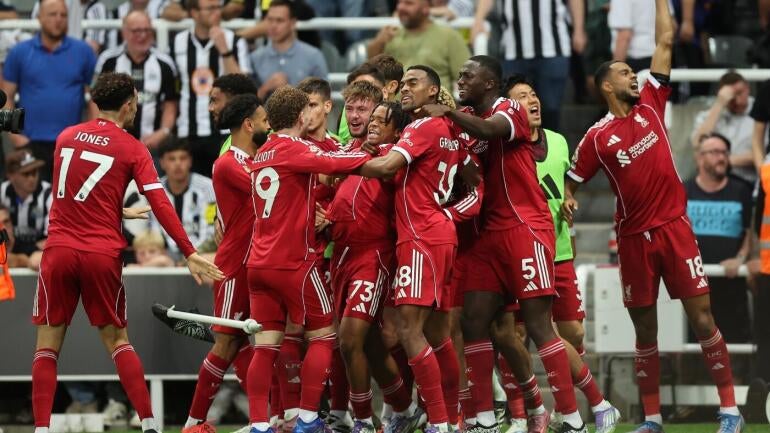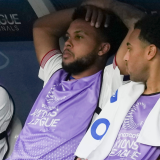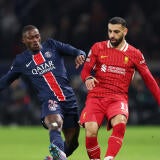Liverpool's lack of balance is creating entertaining chaos: How they've become the world's team to watch
Liverpool have relinquished 2-0 leads in chaos-filled matches to start the season, and things seem to get crazier as the matches go on

The sample size is small but two weeks into the season, it seems like Liverpool have settled into a pattern for their Premier League title defense – a distinctly chaotic one, to be specific. They exhibit every quality of a team that spent around $400 million this summer in transfer fees, dropping almost all of their funds on attack-minded players, no matter the consequence. The byproduct has been thoroughly entertaining, with the Reds taking a 2-0 lead in each of their opening matches, relinquishing it, and then scoring late to clinch the three points they seemed destined to collect a half hour earlier. Conventional wisdom, though, always kicks in at some point during this version of the Liverpool experience, forcing questions about whether or not the Reds are actually capable of a genuine title charge.
After watching Virgil van Dijk and Milos Kerkez succumb to a 10-man Newcastle United on Monday, the concerns are fair. The simple expectation on any team is to win games but that is especially true for a team like Liverpool, who have all the trademarks of a team that is basically obligated to succeed. Title-winning history? Check. Reigning league champions? Check. A bank balance that allowed them to spend hundreds of millions on flashy new signings, creating demand for instant gratification? Check. Each team of this ilk chooses their own stylistic specifications but the pattern of success is usually rooted in routine wins against inferior opponents with a few statement victories mixed in. A deviation from the norm is usually a sign of trouble and with Liverpool, those pain points are particularly easy to spot.
After a preseason in which they kept just one clean sheet and, combined with the FA Community Shield, a third successive week in which they conceded two goals, the Reds' defense is particularly vulnerable to an attack that poses any amount of danger. Veteran van Dijk may officially be post-peak after a few suspect moments to start the season, while Kerkez joins fellow new recruit Jeremie Frimpong as a wingback who is much more suited to the "wing" part of the job than the "back" aspect. With Frimpong injured for Monday's 3-2 win at Newcastle, manager Arne Slot selected midfielder Dominik Szoboszlai for the role and did not gain any defensive resolve from the selection. The circumstances almost entirely eliminate the possibility of standard victories for Liverpool, the squad imbalance so clear and obvious that it creates unnecessarily nervy matches that feel certain to cost them against better opposition.
What a welcome change of pace.
There is an onus placed on title-chasing sides to create machine-like teams that minimize imperfection and while Liverpool have not dialed down their desire for excellence, their new-look group seems built to overwhelm opponents by fully maximizing their strengths. Perfection may not be a priority for the Reds at all this season, which may make for an unsustainable title charge but could usher in a new tactical trend – and a genre of entertainment that should never be discouraged.
The trend of living and dying by the sword
For the last decade and change, the top teams have been defined by a sense of control, usually rooted in ball possession that is designed to restrict the opponent completely. It is a defining aspect of Pep Guardiola's best teams and may likely still be a feature of his Manchester City, now in the midst of this latest rebuild, but it was such a common concept that Brendan Rodgers was making this argument during the 2012-13 season, his first in charge of Liverpool. "When you've got the ball 65-70% of the time, it's a football death for the other team," he said some time before their seventh-place finish that campaign. "It's death by football."
Possession for the sake of it was not an inherently successful strategy – Guardiola and Rodgers are not exactly meant to be grouped together, after all – but at its best, it was extremely effective. Guardiola's Barcelona, Bayern Munich and Manchester City teams, for example, used possession as the foundation of a game that relied on effective passing and the creativity of forward-thinking players to provide the dramatic flair that stumps opponents and thrills audiences. A possession-oriented strategy, though, also paves the way for effective but inherently boring teams, exemplified by Mikel Arteta's Arsenal. His is a strategy that relies on control, though the Gunners have used it to build a defensive juggernaut, successfully keeping opponents at bay time and time again. Arteta has created a title contender along the way, all while sucking the life out of the game on a weekly basis.
No tactical trend, though, is built to survive innovation, which slowly but surely always comes. Possession-oriented managers have recently become willing to cede control when the occasion calls for it, finding ways to catch the opposition off guard without the ball. It is not always glamorous – Ange Postecoglou's Tottenham Hotspur, for example, handed the ball to Manchester United in a drab UEFA Europa League final hoping the Red Devils would be unable to do much with possession and succeeded doing just that. The game's most innovative managers, though, are building teams that may possess but are not defined by it. Take Luis Enrique's Paris Saint-Germain as a prime example – they went on to win last season's UEFA Champions League not because they hold the ball but because of his unique take on a press-oriented style, overwhelming opponents with their intense play in wide areas. Possession is almost a consequence rather than a defining feature.
Enrique is not alone in this approach, either. Hansi Flick's reinvention of Barcelona was built on the same idea. There are hints of evolution from the old tactical trends rather than a rejection, chief among them the high line that has been a staple of the sport's most stylish teams for years, even if it is also the first drawback for those averse to the strategy. Barcelona lived and died by the sword last season, clean sheets a rarity en route to the domestic double and Champions League semifinals. There was an argument to be made that changes in defense are necessary; Jasper Van Leeuwen, a former youth scout at Ajax, has made the case that a team like Barcelona needs faster center backs like Spurs' Micky van de Ven.
Whether or not that tactical evolution comes, though, teams like Barcelona and Liverpool are finding a way to survive by arguing that the best defense may just be a stellar offense.
Liverpool, Arsenal and a season of thought experiments
Liverpool's new reputation for imbalance already feels lived-in but there is still a sense of excitement thanks to the shock value of the approach. Slot's Reds won the title by practicing restraint with Jurgen Klopp's "heavy metal" team, seemingly ready to make his name in England as a manager emblematic of late-stage, possession-oriented play – and without any of the bursts of entertainment that defined Klopp's team. Their summer of spending, though, was a surprise and their overly attack-minded approach even more so.
It is hard to shake the idea that the new version of Liverpool look like a fictionalized team envisioned by someone in a fun FIFA save, a strategy that feels profoundly unrealistic. That is especially true in a sport that has been increasingly defined by pragmatism – managers like Postecoglou are dinged for a lack of practicality rather than the team's squad construction or the regular banalities of organizing a defense. The new-look Reds are a thought experiment in a sport that is in need of some tactical freshness, which adds a fascinating ideological layer to the title race. Slot's Liverpool are a direct stylistic contrast to Arteta's Arsenal, and Guardiola's rebuild with City could throw a fun wrinkle into the mix.
The Reds may benefit from strengthening their defense, even if the links to Crystal Palace's Marc Guehi have grown quiet in recent days. Slot might also find a way to restore balance as the season continues, adding a sense of stability to his team as the title charge gets well and truly underway. Liverpool, though, should not feel obligated to do such a thing. The sport needs a team that is truly equipped to showcase whether or not this overly attack-minded approach works, silly as it may be. The Reds should feel empowered to double down (Triple down? Quadruple down?) on the approach, too, by signing Newcastle's Alexander Isak, who is so desperate for a move to Anfield that he has reportedly listed his home in England's northeast on the rental market. Signing another forward and forgoing a defensive addition with days left to go in the transfer window makes absolutely no sense for a team that scores goals with incredible ease, but the strangeness of it makes it all the more intriguing.
Liverpool's incredible imbalance may mean their title challenge is doomed from the start, which is inherently bad news for anyone with a rooting interest. The Reds, though, deserve the patience to give this unusual strategy the old college try. If the people are lucky, it could work and encourage managers and sporting directors everywhere to build incredibly fun teams. If it doesn't, though, at least the masses will be treated to a banger of a game once a week for an entire season (and twice during a Champions League week).

















